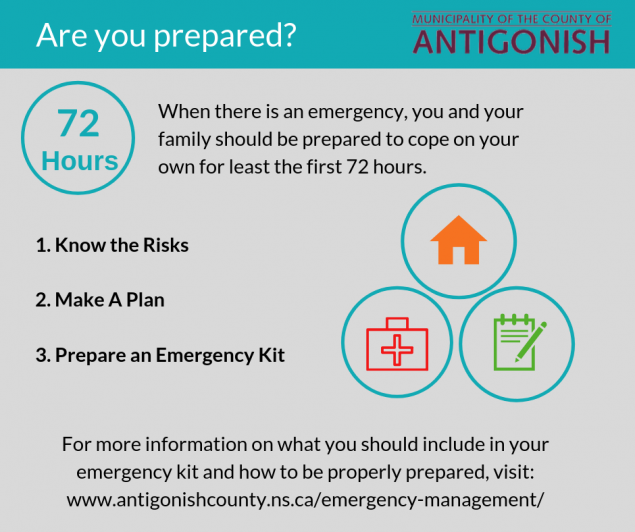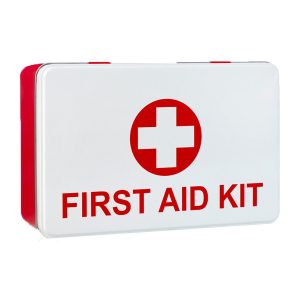Emergency Preparedness
Municipalities are often the first level of response in the event of emergencies. In addition to our Fire Departments the Municipality of the County of Antigonish has a variety of other protective service resources that we draw upon to keep our citizens safe.
When there is an emergency, such as a bad winter storm, hurricane, flood, or fire – you should be ready to cope on your own for at least the first 72 hours.
You never know when an emergency will happen, so it is important to understand the risks and be prepared.

Know the Risks
Risks can include, but are not limited to:
- Winter Storms
- Flooding
- Wildfires
- Hurricanes
- House Fires
- Chemical Spills
- Road Collisions
Evaluate these risks and consider how long you can be on your own without electricity or running water? Should you have extra medicine on hand? What about freshwater and non-perishable food?
Alternatively, what if you must leave your home in a hurry? If authorities call an evacuation order, it means you must leave immediately because your home is at risk or no longer safe.
Make A Plan
A good plan tells you what to do and where to find things during an emergency.
Things to include in your plan:
- Where to find a fire extinguisher, main water valve, electrical box, gas shut off and floor drain;
- Contact information for friends and family;
- Information about you and your family’s health needs; and
- Contact information and instructions for your personal support network;
- Your personal support network is a group of at least three people you trust to help you during an emergency. They should have copies of all your phone numbers and emails. They should also know where you keep your emergency kit and have a key to your home. It is recommended that you include someone in your network that lives outside of your immediate region because they most likely wouldn’t be affected by the same emergency.
Keep a copy of your plan with the information listed above in your emergency kit, at home, in your car, and at work.
Prepare an Emergency Kit
Your emergency kit should have everything you need to keep you and your family sustained for at least 72 hours. The kit should be easy to carry and should be checked twice a year to ensure everything is in proper working order.
Things to include in your kit:
- Your plan;
- A list of your personal support network, including their name, relation, address, and phone numbers;
- At least 6L of water per person (2L per day);
- Food that won’t spoil ;
- Manual can opener;
- First aid supplies;
- Allergy medications and special needs equipment you may require;
- A list of your prescription medications with the prescription number and purpose;
- At least a 3 day supply of prescription medicines;
- Pharmacy information;
- Pet care;
- Infant formula;
- Wind-up or battery-powered flashlight;
- Wind-up or battery-powered radio;
- Batteries for your flashlight and radio;
- Extra keys for your house and car;
- Money in small bills; and
- Copies of important papers such as driver’s license, birth certificate, and insurance policies.

Who do you contact in case of an emergency?
Blaise MacDonald
Antigonish Emergency Management Coordinator
Phone: 902-863-1117
Additional numbers:
911 – for Health, Safety or Property Emergencies
811 – for Health Information
511 – Road Conditions
211 – Provincial Government Program and Services Information
Antigonish County Water and Sewer
Regular Business Hours:
Monday to Friday from 9:00 am to 4:30 pm
Phone: 902-863-5004 or 902-863-1117
After hours and on weekends and holidays (Emergencies only please):
Phone: 1-902-318-3277
Other important phone numbers:
Nova Scotia Power Outage Centre: 1-877-428-6004
Bell Aliant Outage: 611 or 1-800-663-2600
Eastlink Outage: 1-888-345-1111
Drinking Water Safety: 1-877-936-8476
Food Safety: 1-877-252-FOOD (3663)
For more information on how to properly prepare for a disaster or emergency visit:
RCMP
For more information on the services they provide at the Antigonish detachment, please visit their website.
